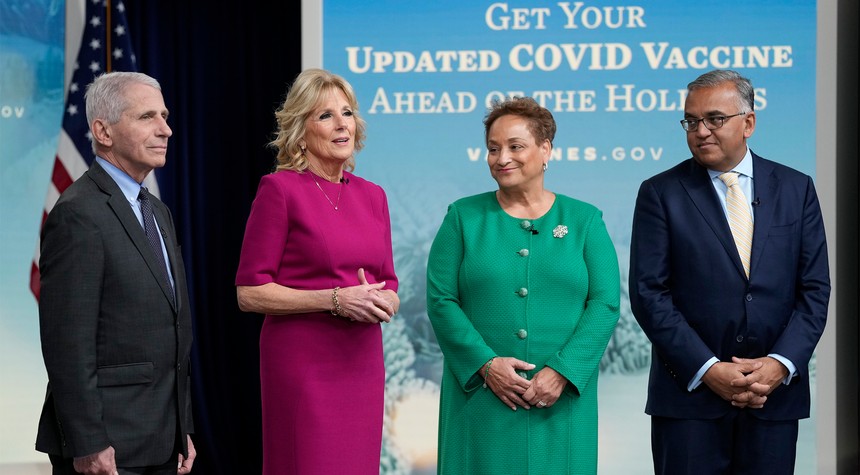NIH quashed study because it wouldn't show what they wanted.

Back in March 2021, when the vaccines were still fairly new and there was much research to be done on what they could accomplish, Dr. Fauci announced a study intended to find out how effective the vaccines actually were at preventing infection and retransmission of the COVID virus.
The study was called PreventCOVIDU–the U referring to the study cohort who would be students at colleges and universities.
It sounded pretty good, all in all. After all, the data on how well the vaccines would prevent the spread of the virus didn’t exist. Even the vaccine makers made no real claims that they would prevent the spread of the disease, although plenty of public health officials and politicians were making wildly unsubstantiated and inaccurate claims that the vaccine would stop the virus dead in the water.
That, in fact, was the underlying basis for forcing the vaccines on people: failing to take the jab put others at risk. A pretty weak argument, given the assertions at the time that the vaccine would prevent infections. The vaccinated needed protection from the unvaccinated? How weird is that?
Still, doing actual research on the question would be a step in the right direction, so the idea of doing the study made a lot of sense.
Thousands of college students participating in a new trial called PreventCOVIDUopens in a new tab or window will help determine how well COVID-19 vaccines diminish risk of transmitting the infection, officials said Friday.
That the vaccines are highly effective at preventing symptomatic illness is well established.
“But the prevailing question is, when these people get infected, how often is that, if they’re asymptomatic, how much virus do they have in their nose?” said Anthony Fauci, MD, President Biden’s chief medical advisor and director of the National Institute of Allergy and Infectious Diseases, during a White House briefing. “And do they transmit it to people who are their close contacts?”
The open-label randomized trial, which began on Thursday, will test whether vaccine prevents both infection and transmission of SARS-CoV-2 among college students, and will “help inform science-based decisions about mask use and about social distancing post-vaccination,” Fauci added.
The NIH-funded study will include 12,000 college students ages 18 to 26 from more than 20 universities, and is expected to last 5 months, Fauci said. One group of 6,000 students will receive their first dose of the Moderna vaccine immediately. The others will serve as controls and will receive their vaccine 4 months later.
All participants will ultimately receive the usual two doses.
Participants will swab their noses daily for SARS-CoV-2 infection, provide blood samples periodically, and complete surveys through an electronic diary app. They will also be asked to follow their university’s SARS-CoV-2 protocols and get tested twice each week, according to the study’s website.
Actual science. Something other than wild speculation passed off as scientific conclusions.
I was reminded of this by a doctor on Twitter who remembered the announcement of the study and wondered what the results were. After all, the trial was supposed to last 5 months, and the results should have been available long ago, given how pressing the question was.
So she looked for the results, and found only this on the website for the study:

Uh, what? Did they end the study without actually getting or releasing any results? Why?
Yes, they did, and their answer to why is hardly convincing. The question wasn’t whether they could get people vaccinated, but whether the vaccines gave the promised results. Ending the study because of “the success of the COVID-19 vaccination program in the US” makes precisely zero sense.
We actually needed to know the answer to the question that was being studied: do the vaccines work to prevent the spread of the disease?
Obviously, they stopped the study because the answer was a resounding NO! And they didn’t like that answer. The best way to not get that answer definitively was to end the study before it could prove it.
This is Fauci’s baby. He announced it from the White House podium. He obviously thought the answer would be yes and that it would bolster his power. When it turned out that the answer was no, he buried it.
This is what “science” in the current era looks like. It is nothing more than fishing for the answers you have decided you want, not interrogating reality to discover what actually is.
Canceling a study like this is unforgivable. It would have provided hard data on an important question: do the vaccines make a difference for people other than the individual vaccinated?
The only justification for requiring vaccines could possibly be that doing so is pro-social to a significant extent, meaning that not getting vaccinated puts others at substantial risk. If your decision impacts only yourself, it is literally nobody’s business at all. We don’t prevent people from engaging in other “risky” behavior such as mountain climbing, motorcycle racing, or mixed martial arts fighting.
We allow people to make personal choices. The only argument for any other path is that doing so has a disproportionate impact on others. It’s why we contemplate quarantine for some illnesses, despite the impact on personal freedom.
Of course, COVID never rose to the level where anything like a mandate or quarantine was actually justified, but some diseases do.
Fauci’s killing this study was unforgivable, and purely political. It was going to prove that his preferred policies were unjustified, so he simply quashed it with a totally bogus justification.
Trust the Science™.
What science?
No comments:
Post a Comment